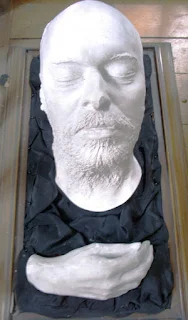He is not a prophet, but an artist; yet an artist who, by the very intensity of his artistic vision, and by some inborn bent toward symbol and mysticism, stands on the side of those who see in material things a spiritual significance, and utters words of universal meaning from the fullness of his own heart. (William Morris, Arts & Crafts Movement, describing Dante Gabriel Rossetti)
As Dante Gabriel Rossetti's health was declining, his brother William wanted a death mask made, so he asked a man from Brucciari's to come to Gabriel's bungalow in Birchington-On-Sea. When William saw such a peaceful expression on his brother's face, he then asked Frederick Shields if he would draw Gabriel's face. He made one for William and one for their sister, Christina Rossetti - the poetess. It was then time for William's daughter, Lucy, himself, and Christina to visit the Rectory to meet Mr. Alcock. They all walked to the churchyard to choose a spot for the grave. Mr. Martin then made the funeral arrangements.
Dear Mr. Scott - I think you will like to hear your dear friend Gabriel Rossetti was buried, so I will tell you- The church at Birchington stands back about three quarters of a mile from the sea on slightly rising ground which looks over the open land and the sea. I thought simply; it is nicely kept, and to-day was full of Easter flowers. Close to Gabriel's grave there was a laurestinus and a lilac.
The church in Birchington was a clifftop setting overlooking the sea. It was the opposite to what you find at Highgate Cemetery in London which is exactly what Dante Gabriel Rossetti wanted. Separating his burial location from that of his family allowed Rossetti's achievements as a poet, translator, and artist to be commemorated by his dearest friends. Colleague, Ford Maddox Brown, was asked by William Michael Rossetti if he would design a monument for his brother's grave and the cross was added. Walter Caine and Theodore Watts were the last to leave Birchington. Walter Caine describes his farewell visit to his friends grave,At the gravesite, wonderful to say, was the old mother supported by William on one side and Christina on the other - a most pathetic sight. She was very calm, extraordinarily calm, but whether from self-command, or the passivity of age, I do not know - probably from both; but she followed all the proceedings with close interest. Then around was a company of about fifteen or twenty, many of them friends of yours, and several of them whom I did not know. The service was well read by the vicar. Then we all looked into the resting place of our friend, and thought and felt our last farewells - many flowers, azealas, and primrose, were thrown in. I saw William throw in his Lily of the Valley.
This is all I have to tell you. Sad it was, very sad but simple and full of feeling and the fresh beauty of the day made itself felt with all the rest. I shook hands with William and came home with Mr. Graham. Dear Gabriel, I shall not forget him. (Vernon Lushington letter to William Bell Scott, 14 April, 1882)
We walked one morning to the churchyard and found Gabriel's grave strewn with flowers. It was a quiet spring day, the birds were singing, and the yellow flowers were beginning to show. As we stood by the grave under the shadow of the quaint old church, with the broad sweep of landscape in front, so flat that the great dome of the sea appeared to lie on it, and with the sleepy rumble of the rolling waters borne to us from the shore, we could not but feel that little as we had thought to leave Rossetti there, no other place could be quite so fit.
Three of Dante Gabriel Rossetti's closest friends wrote In Memoriam poems in his honor : one on the day of his death April 9 1882 and two poems on the day of his funeral April 14, 1882.
At the Grave of Dante Gabriel Rossetti by Mackenzie Bell
| HERE of a truth the world’s extremes are met: | |
| Amid the gray, the moss-grown tombs of those | |
| Who led long lives obscure till came the close | |
| When, their calm days being done, their suns were set— | |
| Here stands a grave, all monumentless yet, | 5 |
| Wrapped like the others in a deep repose; | |
| But while yon wakeful ocean ebbs and flows | |
| It is a grave the world shall not forget, | |
| This grave on which meek violets grow and thyme, | |
| Summer’s fair heralds; and a stranger now | 10 |
| Pauses to see a poet’s resting-place, | |
| But one of those who will in many a clime | |
| On each return of this sad day avow | |
| Fond love’s regret that ne’er they saw his face. April 9th, 1882 |
A GRAVE BY THE SEA
I Yon sightless poet [157] whom thou leav’st behind, Free from the day, and piercing Life’s disguise II I stand like her who on the glittering Rhine I stand like her, for she, and only she, III Last night Death whispered: ‘Death is but the name With Nature dumb, save for the billows’ moan, IV Last night Death whispered: ‘Life’s purblind procession, p. 159I answered thus: ‘If Friendship’s isle of palm V Yea, thus I boldly answered Death—even I Yet while I spoke I sighed in loneliness, Birchington, |









